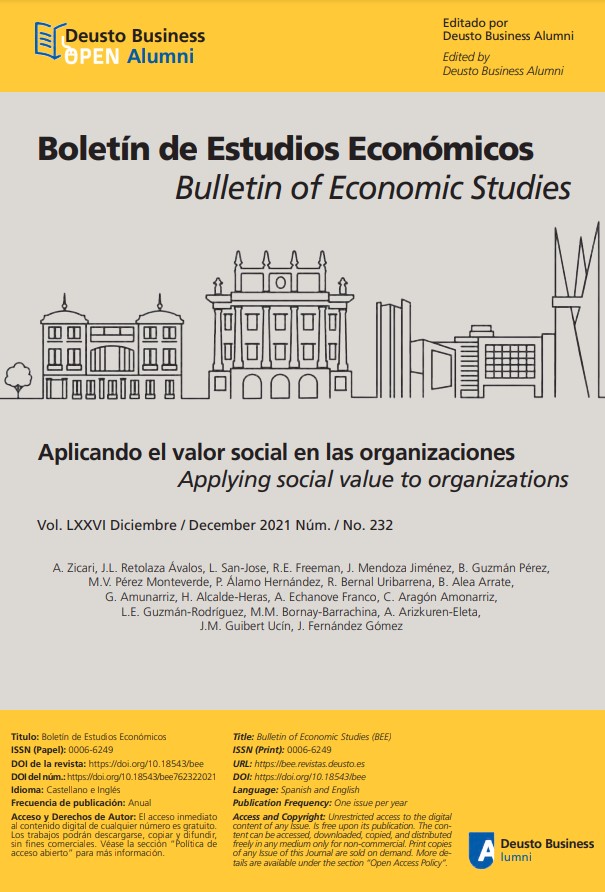The European Green Deal and the energy transition: challenges and opportunities for industrial companies
Abstract
This article reviews the challenges and opportunities facing industrial companies in europe as a result of the implementation of the European Green Deal, the growth and competitiveness strategy for the European Union announced by the European Commission in December 2019. The objective of achieving a reduction of 55% in greenhouse gas (GHG) emissions in 2030 relative to 1990 and zero net emissions in 2050 will force industrial companies to take urgent steps to decarbonize their activities. This will imply profound changes in their business operations and the need to invest in new technologies and processes and substitute clean energy for conventional fossil fuels. In order to support this transformation, sound innovation policies must be put in place and an efficient sustainable finance ecosystem must be developed. The article explores how industrial companies can transform their operations while simultaneously complying with the grand objectives of the European Green Deal and preserving and even enhancing their competitiveness.
Received: 21 June 2021
Accepted: 3 February 2022
References
Bhatnagar, S. (2021). Five Actions to Improve the Sustainability of Steel [web article]. EY. Retrieved from: https://www.ey.com/en_jo/mining-metals/fiveactions-to-improve-the-sustainability-of-steel.
Climate Change Committee. (2019). Net Zero - The UK’s contribution to stopping global warming. Retrieved from: https://www.theccc.org.uk/wp-content/uploads/2019/05/net-zero-the-uKs-contribution-to-stopping-global-warming.pdf.
Colla, V. & Branca, T. A. (2021). Sustainable steel industry: energy and Resource efficiency, low emissions and carbon-lean Production. Metals, 11, 1469. https://doi.org/10.3390/met11091469.
David, A., Semanik, M. & Torsekar, M. (2018). Framework for Analyzing the Competitiveness of Advanced Technology Manufacturing Firms. Office of Industries Working Paper ID-057. Retrieved from: https://www.usitc.gov/publications/332/working_papers/competitiveness_of_advanced_technology_manufacturing_firms_id_18_057_091718.pdf.
European Commission. (N.D.). Research and innovation to drive the Green Deal. Retrieved from: https://op.europa.eu/en/publication-detail/-/publication/a96cfbb5-5941-11eb-b59f-01aa75ed71a1/language-en/format-PdF/source-185507091.
European Commission. (2019). The European Green Deal. Communication from the Commission to the European Parliament, the European Council, the Council, the European Economic and Social Committee and the Committee of the Regions. COM/2019/640 final. Retrieved from: https://eur-lex.europa.eu/legalcontent/en/tXt/?qid=1588580774040&uri=celeX%3A52019dc0640.
Fernández Gómez, J. (2021). The European Green Deal and the Energy Transition: Economic and Industrial Opportunities for the Basque Country [web article]. https://www.deustobusinessopenalumni.es. Retrieved from: https://www.deustobusinessopenalumni.es/s/colaboracion/the-european-green-deal-and-the-energy-transitioneconomic-and-industrial-opport-mcWzmisnm3mJdA5KHcAVs7nlKioA.
Fernández, J. & Larrea, M. (2020). Oportunidades del Pacto Verde Europeo para la Competitividad de Euskadi. Report prepared for ihobe. Retrieved from: https://www.ihobe.eus/actualidad/orkestra-e-ihobe-elaboran-un-informe-sobreoportunidades-pacto-verde-europeo-para-competitividad-euskadi.
Fernández Gómez, J. & Larrea Basterra, M. (2021a). Presentation (introduction to the special issue on energy transition). Ekonomiaz-Revista Vasca de Economía, 99, 1st semester. ISSN: 0213-3865. Retrieved from: https://www.euskadi.eus/web01-a2reveko/es/k86aekonomiazWar/ekonomiaz/abrirArticulo?idpubl=96®istro=6.
Fernández Gómez, J. & Larrea Basterra, M. (2021b). Fostering Green financing at the subnational level. the case of the basque country. Ekonomiaz-Revista Vasca de Economía, 99, 1st semester. ISSN: 0213-3865. Retrieved from: https://www.euskadi.eus/web01-a2reveko/es/k86aekonomiazWar/ekonomiaz/abrirArticulo?idpubl=96®istro=14.
Fernández Gómez, J. & Larrea Basterra, M. (2021c). El papel de los Gobiernos en el desarrollo de ecosistemas eficientes e innovadores de financiación de las grandes transiciones. Report for the Economics and Finance Department, Basque Government. Mimeo. Work in progress.
Fernández Gómez, J., Kamp, B. & Retegi Albisua, J. (2021). Transición Verde en la Unión Europea, Competitividad Empresarial y Ecoinnovación. Report for Ihobe-environmental Agency, Basque Government. Mimeo. Work in progress.
Grubler, A. (2012). Energy transitions research: insights and cautionary tales. Energy Policy, 50, 8-16. https://doi.org/10.1016/j.enpol.2012.02.070.
Horton, P. M., Allwood, J. M. & Cleaver, C. (2019). Implementing material efficiency in practice: A case study to improve the material utilisation of automotive sheet metal components. Resources, Conservation & Recycling, 145, 49-66. https://doi.org/10.1016/j.resconrec.2019.02.012.
Mazzucato, M. & Dibb, G. (2019). Missions: A beginner’s guide. UCL Institute for Innovation and Public Purpose (IIPP) Policy Brief Series: IIPP PB 09. Retrieved from: https://www.ucl.ac.uk/bartlett/public-purpose/sites/public-purpose/files/iipp_policy_brief_09_missions_a_beginners_guide.pdf.
Parsons Brinckerhoff & DNV GL. (2015a). Industrial Decarbonisation & Energy Efficiency Roadmaps to 2050. Cross-Sector Summary. Retrieved from: https://assets.publishing.service.gov.uk/government/uploads/system/uploads/attachment_data/file/419912/Cross_Sector_Summary_Report.pdf.
Parsons Brinckerhoff & DNV GL. (2015b). Industrial Decarbonisation & Energy Efficiency Roadmaps to 2050. Iron & Steel. Retrieved from: https://assets.publishing.service.gov.uk/government/uploads/system/uploads/attachment_data/file/416667/Iron_and_Steel_Report.pdf.
Raabe, D., Cem Tasan, C. & Olivetti, E. A. (2019). Strategies for improving the sustainability of structural metals. Nature, 575, 64-74. https://doi.org/10.1038/s41586-019-1702-5.
Von Gleich, A. (2006). Outlines of a sustainable metals industry. in A. von Gleich et al. (eds.), Sustainable Metals Management. Eco-Efficiency in Industry and Science, 3-40. Dordrecht: Springer. ISBN 978-1-4020-4007-8.
License:
Works published in this journal are available since 2021 under the Creative Commons Attribution-NonCommercial 4.0 International license - CC BY-NC 4.0. Content prior to 2021 is not covered by the journal's current Open Access policy.
Authors' Rights:
Authors retain copyright over their work published in the Bulletin of Economic Studies and grant the Bulletin of Economic Studies non-exclusive rights to exploit the work for layout, publication, and dissemination purposes. This license allows the Bulletin of Economic Studies to distribute, reproduce, and disseminate the work on its platform and through other media, subject to the conditions outlined in this notice.
Readers' Rights:
Readers may read, download, print, search, share (copy, redistribute, or link to full text), or adapt (remix, transform, and build upon the material) the content, provided that:
- The materials are not used for commercial purposes.
- The original work is properly cited, including the name of the author and the source.
- Any modifications made to the original content are clearly indicated.
Commercial use of the materials is prohibited without the express permission of the authors. For clarity, commercial use is defined as any activity intended for financial gain or involving direct commercial exchange.
Conditions of Use:
The use of content must not infringe the rights of others or be used in a way that could damage the reputation of the author or the Bulletin of Economic Studies.
Responsibility for Content:
Authors are responsible for the content of their papers and the Bulletin of Economic Studies is not responsible for the opinions therein expressed.
More Information:
Open Access, Licensing, and Copyright Policy


.jpg)
.jpg)
.jpg)








